Launching Your Online Course: Choosing the Right Platform
Ready to share your expertise with online courses and boost your Shopify or arts and crafts business? Choosing the right platform can be tricky. This list compares ten popular options—Tevello, Teachable, Thinkific, Kajabi, LearnWorlds, Podia, Teachery, Udemy, Moodle, and WordPress with LearnDash—to help you find the best fit. We'll cut through the noise and highlight key features, pricing, and integrations so you can quickly launch your course and start earning. Stop struggling with scattered resources and inconsistent branding; these platforms provide the tools to create, manage, and sell your courses seamlessly.
1. Tevello
Tevello stands out as a comprehensive platform specifically designed for Shopify store owners seeking to integrate digital products seamlessly into their existing eCommerce setup. Instead of directing customers to external learning platforms, Tevello allows you to create and sell online courses, memberships, and communities directly within your Shopify environment. This unified approach simplifies the customer journey and creates opportunities to enhance your brand experience and boost revenue. Think of it as a central hub where your physical and digital products coexist, fostering a deeper connection with your customer base. This makes it a particularly appealing option for Shopify users in niche markets like arts and crafts, where selling instructional content alongside supplies can create a synergistic sales strategy. Imagine, for example, a pottery supply store on Shopify also offering online pottery classes – all within the same storefront.
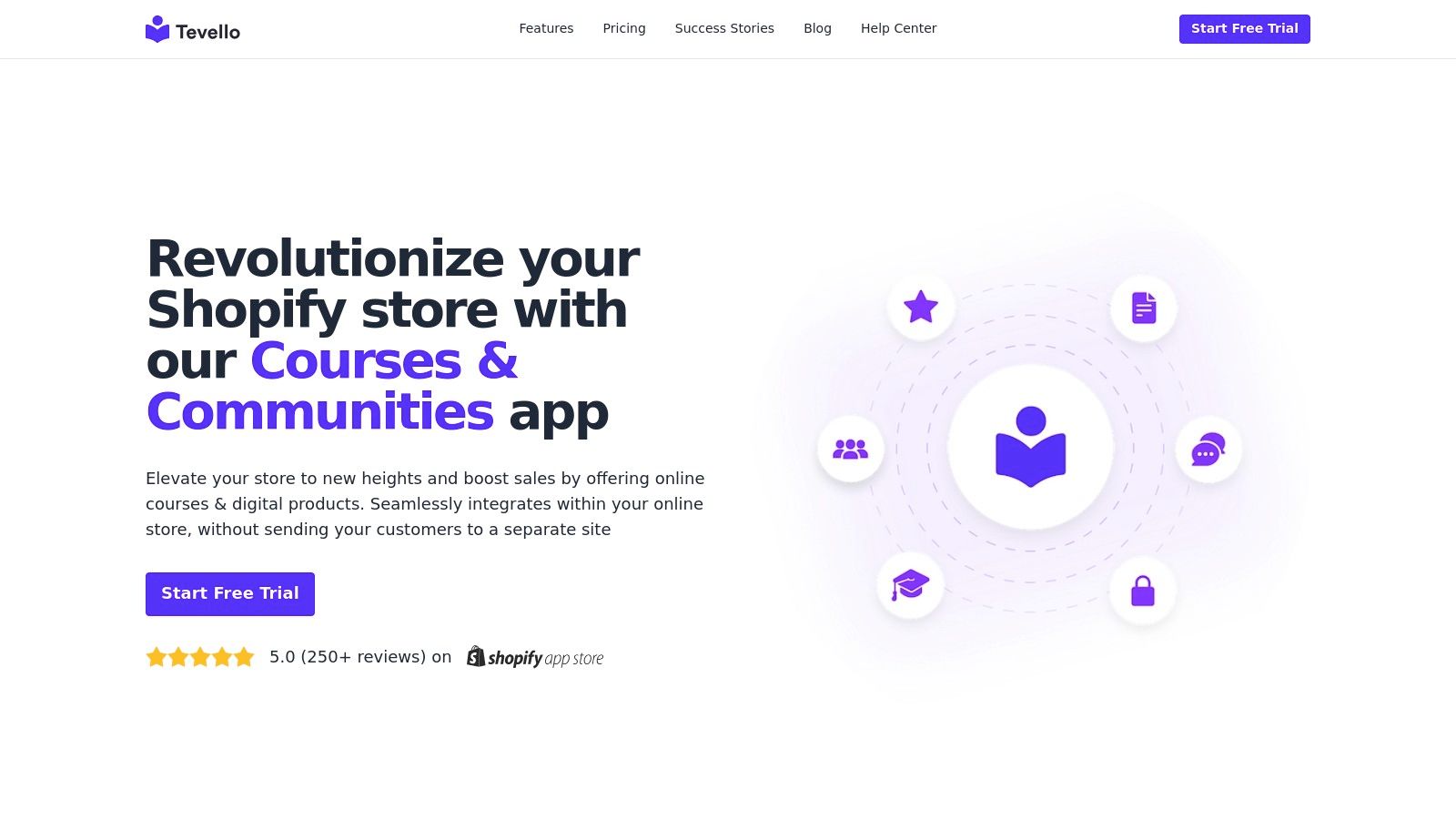
Tevello's robust features empower you to craft engaging and effective learning experiences. You can build customizable learning paths, interactive workshops, drip content series, and subscription-based modules tailored to your specific audience. Automated customer onboarding and course enrollments through Shopify Flow streamline administration, freeing you up to focus on content creation and community building. The platform also boasts robust video hosting capabilities, multilingual support, and, importantly, dedicated personal support to guide you through the process. Learn more about Tevello and how it might be the right platform for your online course. Businesses like Crochetmilie and Vanity Fair School of Beauty leverage Tevello to streamline their operations and increase digital product revenue, providing compelling case studies for its effectiveness.
While pricing information isn't readily available on the Tevello website, you can request a demo to discuss specific needs and pricing tiers. Technical requirements are minimal, primarily revolving around having an existing Shopify store. Implementing Tevello involves installing the app from the Shopify App Store and configuring your courses and community features. While some initial setup and learning will be involved, the platform's intuitive design makes it relatively accessible, even for beginners in the online course creation space.
Pros:
- Seamless Shopify Integration: Creates a unified eCommerce and learning experience within your existing Shopify store.
- Customization: Offers highly customizable features for courses and community building, from learning paths to interactive workshops.
- Automation: Simplifies onboarding, enrollment, and notifications through Shopify Flow integration.
- Revenue Generation: Enhances upselling and cross-selling potential by linking digital products with physical goods.
- Support: Provides strong customer support and resources, along with positive testimonials and success stories.
Cons:
- Shopify Exclusive: Limited to Shopify users, excluding businesses on other eCommerce platforms.
- Learning Curve: May require a short learning curve for those new to creating and managing online courses, despite its user-friendly interface.
Website: https://tevello.com/
Tevello earns its place on this list due to its specialized focus on Shopify integration. For Shopify store owners seeking a streamlined solution to incorporate and sell digital learning products, Tevello offers a compelling combination of functionality, automation, and support. Its ability to enhance the customer experience and unlock new revenue streams makes it a valuable tool for businesses looking to expand their offerings and engage their audience more deeply.
2. Teachable
Teachable is a popular all-in-one platform specifically designed for creating and selling online courses. It simplifies the technical complexities of hosting, payments, and student management, allowing creators to concentrate on content development and marketing. This makes it an excellent choice for Shopify store owners and arts and crafts business owners who want to expand their offerings by teaching their skills or sharing their expertise without the hassle of managing a separate website or complex technical integrations. Imagine a Shopify store owner selling handmade jewelry wanting to offer an online course on jewelry making. Teachable provides them with all the tools to do so without requiring coding or web development experience. Similarly, an artist selling paintings could use Teachable to offer online painting tutorials, expanding their reach and revenue streams.
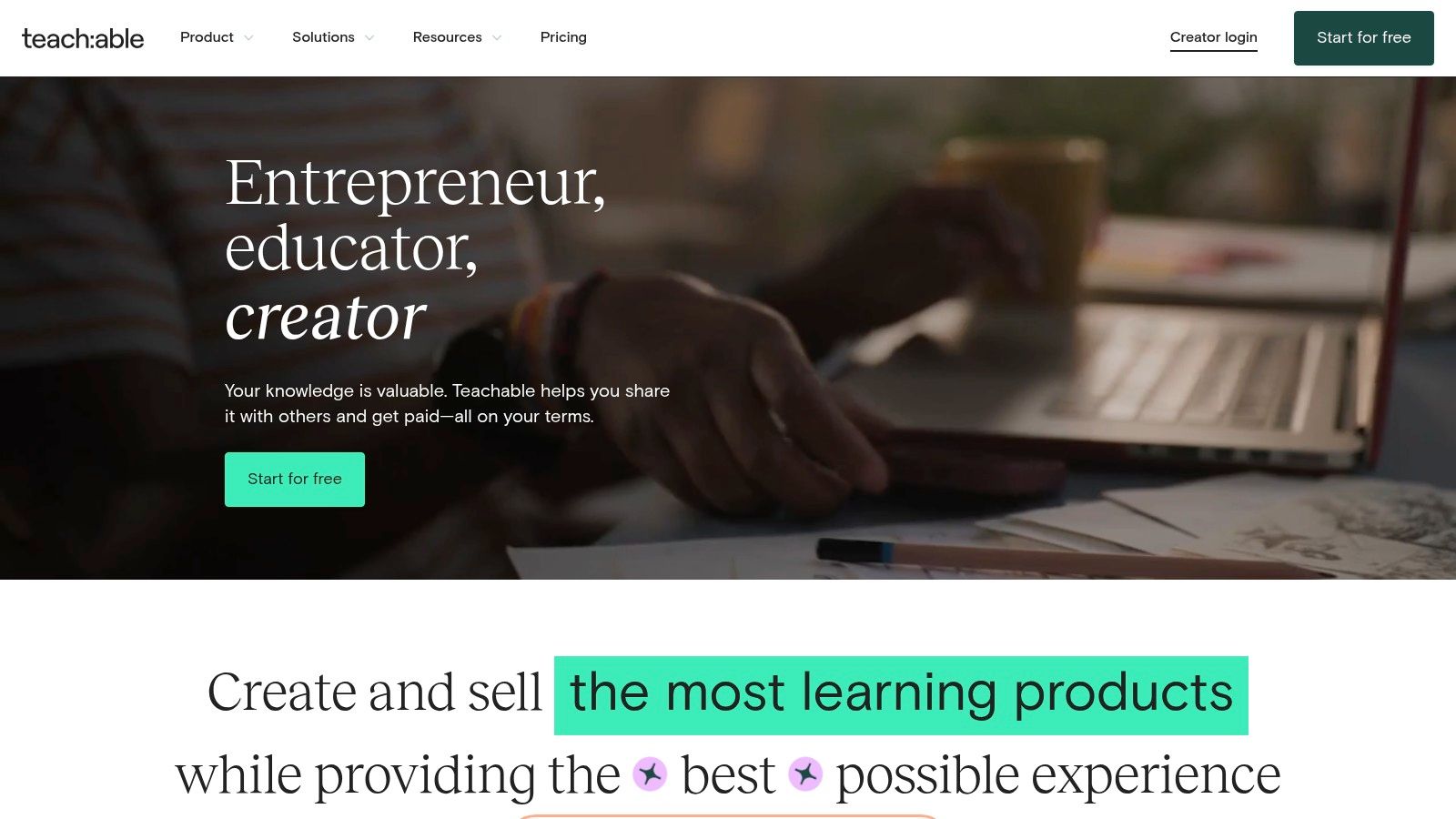
Teachable's user-friendly interface allows for easy course creation, even for beginners. You can upload videos, PDFs, and other resources to create a structured learning experience. Features like quizzes, discussion forums, and course completion certificates enhance student engagement and provide a sense of accomplishment. The integrated payment processing via PayPal and Stripe simplifies transactions, and Teachable handles the EU VAT/tax compliance, a significant benefit for those selling to European customers. The ability to offer coupons and run affiliate programs directly within the platform provides valuable marketing tools to boost sales. You can even customize your course website with your own branding and domain name for a professional look and feel.
For Shopify store owners, Teachable can seamlessly integrate with your existing marketing efforts. You can cross-promote your courses to your customer base, driving traffic and diversifying revenue streams. For artists and crafts business owners, Teachable provides a dedicated platform to monetize your knowledge and skills, reaching a wider audience than traditional workshops or classes allow.
Pricing: Teachable offers various paid plans, starting with a free plan (with limitations). Paid plans unlock features like unlimited students and courses, custom domain usage, and removal of Teachable branding. The free plan has transaction fees, while paid plans offer reduced or no transaction fees depending on the chosen tier. Specific pricing details are available on their website.
Technical Requirements: No specific technical skills or software are required. Course creation and management are handled through Teachable's web-based interface.
Comparison with Similar Tools: Compared to platforms like Thinkific or Podia, Teachable is known for its robust marketing features and comprehensive all-in-one approach. Thinkific might offer slightly more customization options, while Podia focuses on a simplified experience with fewer features. Teachable finds a good balance between functionality and ease of use.
Implementation/Setup Tips:
- Plan Your Course Content: Before jumping in, outline your course modules and content. This ensures a structured learning experience for your students.
- Utilize the Marketing Tools: Leverage Teachable's built-in marketing features like coupons and affiliate programs to promote your courses.
- Brand Your School: Customize the look and feel of your Teachable school to align with your existing brand. This creates a consistent experience for your audience.
- Engage with Your Students: Actively participate in discussions and provide feedback to foster a thriving learning community.
Website: https://www.teachable.com/
Teachable earns its place on this list due to its comprehensive features, ease of use, and focus on helping creators monetize their knowledge. Its robust marketing tools and integrated features make it an ideal choice for both beginners and experienced online course creators.
3. Thinkific
Thinkific is a robust platform specifically designed for entrepreneurs looking to create, market, and sell online courses. It's a great option for Shopify store owners and arts and crafts business owners who want to expand their offerings and build deeper connections with their customer base. Imagine supplementing your product sales with online workshops demonstrating crafting techniques, or offering exclusive online courses to VIP customers. Thinkific empowers you to monetize your expertise and create new revenue streams. This platform stands out for its no-transaction-fee policy across all plans, allowing you to maximize your profits. It also offers extensive customization, ensuring your courses align perfectly with your existing brand. You control your content, your student data, and the overall learning experience.
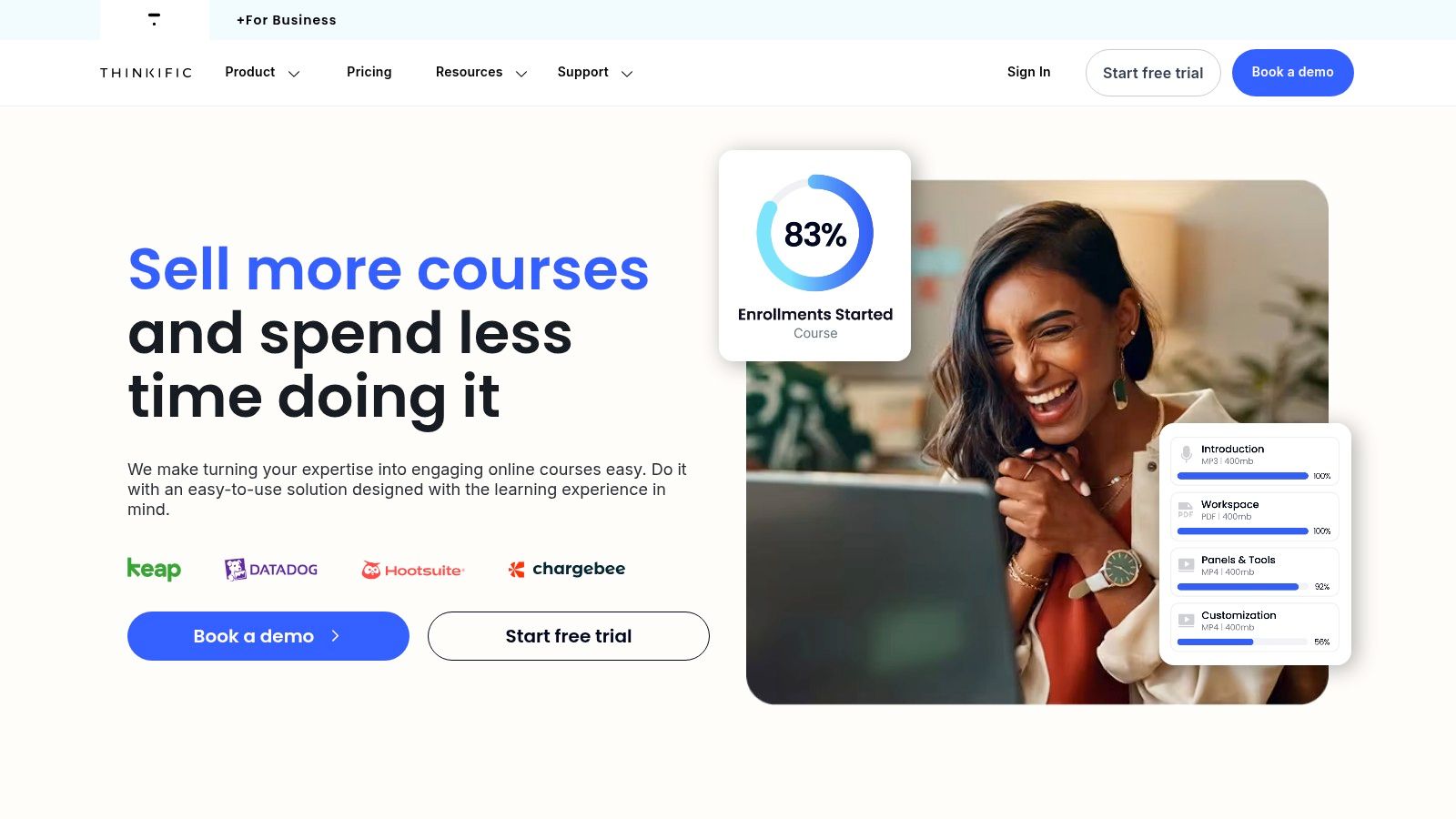
Thinkific’s drag-and-drop course builder makes it easy to upload multimedia content like videos, presentations, and downloadable resources. You can even integrate live lessons via Zoom, creating interactive learning experiences. Advanced quizzing and assessment capabilities allow you to gauge student progress and offer certificates upon completion, fostering a sense of accomplishment. The membership site functionality opens up opportunities for recurring revenue, creating a loyal community around your brand. For example, a Shopify store owner selling art supplies could offer a monthly membership with exclusive online tutorials and discounts.
Compared to platforms like Teachable and Podia, Thinkific offers more robust customization options for course and site design, empowering you to truly own your brand experience. While Teachable might be slightly easier to get started with, Thinkific's flexibility and control are invaluable for businesses looking to build a long-term online education strategy. Learn more about Thinkific and discover how it can transform your online presence.
Thinkific offers several pricing tiers, starting with a free plan that allows you to build one course with limited features. Paid plans unlock additional features like unlimited courses, students, and marketing tools. While pricing information can fluctuate, it's generally more expensive than some basic alternatives, but the robust feature set justifies the investment for serious course creators. Check their website for the most up-to-date pricing details. While no specific technical requirements are publicly listed beyond a stable internet connection and a modern browser, Thinkific is a cloud-based platform, so there's no software to install.
Pros:
- No transaction fees: Maximize your earnings on every course sale.
- Robust course completion certificates and gamification: Enhance the learning experience and motivate students.
- Strong customer support including phone support: Receive timely assistance when you need it.
- Includes marketing tools like upsells and bundles: Increase your average order value and promote multiple courses.
- High degree of customization: Tailor the platform to fit your brand seamlessly.
Cons:
- Limited email marketing capabilities: You might need to integrate with a third-party email marketing service.
- More expensive than some alternatives: Consider your budget and the features you need.
- Learning curve for beginners: While the drag-and-drop builder is intuitive, mastering all the features can take time.
- Some advanced features only available on higher-tier plans: Factor this into your budget planning.
Website: https://www.thinkific.com/
Implementation Tip: Start with a free plan to explore the platform and build your first course. As your needs grow and you're ready to expand your offerings, upgrade to a paid plan to unlock more advanced features and marketing tools. Consider pre-selling your first course to validate your idea and generate excitement before launching.
4. Kajabi
Kajabi distinguishes itself from other online course platforms by offering a comprehensive suite of tools designed to manage every aspect of a knowledge commerce business, from course creation and delivery to marketing and sales. This makes it particularly attractive for Shopify store owners and arts and crafts business owners looking to expand their offerings and build a loyal customer base through educational content. Imagine selling online courses on pottery techniques alongside your ceramic products or offering a masterclass in jewelry making to complement your existing jewelry line. Kajabi empowers you to do this seamlessly, all within a single platform. Rather than juggling multiple subscriptions for website hosting, email marketing, landing page creation, and course delivery, you can centralize everything within Kajabi. This integrated approach streamlines your workflow and allows you to focus on creating high-quality content and engaging with your students.
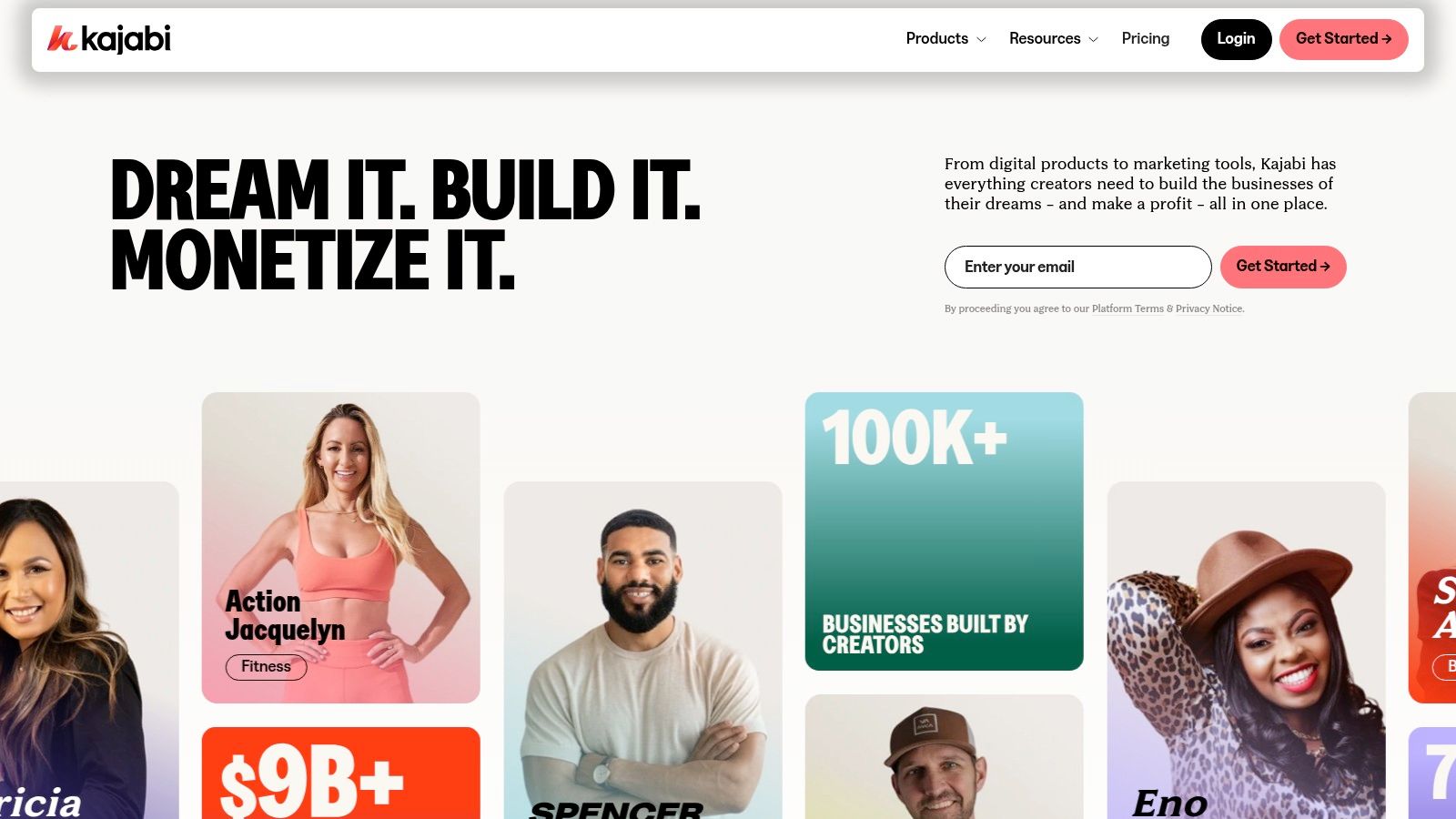
Kajabi's all-in-one nature is a significant advantage for entrepreneurs seeking to build a scalable online course business. Features like the integrated email marketing system, pipeline builder, and community features allow you to nurture leads, automate marketing campaigns, and foster a thriving student community. For instance, you can create automated email sequences to welcome new students, deliver course materials, and promote upcoming workshops. The platform also offers robust analytics to track student progress and engagement, allowing you to refine your content and marketing strategies. You can even build membership sites to provide exclusive content and community access to your most dedicated students. If you're looking to delve deeper into maximizing the potential of your online courses, you can learn more about Kajabi and its best practices.
While Kajabi boasts an impressive array of features, it's important to consider the cost. It sits at a higher price point than many competitors, making it a more significant investment, particularly for businesses just starting out. The extensive feature set can also lead to a steeper learning curve, although the platform provides resources and support to help users get acclimated. While Kajabi offers professional templates for courses, websites, and marketing materials, customization options can be somewhat limited compared to specialized tools. Lastly, lower-tier plans impose product limits, which might restrict scaling for businesses planning to offer a large number of courses.
Features:
- All-in-one platform with website, marketing, and course tools
- Powerful automation and pipeline (funnel) builder
- Integrated email marketing system
- Community features for student engagement
- Built-in blogging platform
Pros:
- Comprehensive solution requiring fewer third-party integrations
- Professional templates for courses, websites, and marketing
- No transaction fees
- Advanced marketing automation capabilities
Cons:
- Significantly higher price point than competitors
- Steeper learning curve due to extensive features
- Limited customization in some areas compared to specialized tools
- Product limits on lower-tier plans
Website: https://kajabi.com/
Kajabi deserves its place on this list because it offers a powerful, integrated solution for entrepreneurs serious about building a thriving online course business. For Shopify and arts and crafts business owners, Kajabi provides the tools to seamlessly integrate educational content into their existing product offerings, fostering customer loyalty and creating new revenue streams. However, the higher price point and learning curve warrant careful consideration, especially for businesses with limited budgets or technical expertise.
5. LearnWorlds
LearnWorlds is a robust online course platform geared towards creating engaging and interactive learning experiences, making it a compelling choice for Shopify store owners and arts and crafts business owners looking to expand their offerings with online workshops, tutorials, or courses. It allows you to build a premium learning environment that goes beyond simple video lectures, fostering a deeper connection with your audience and potentially driving more sales through enhanced customer loyalty and valuable educational content. Imagine offering an in-depth course on pottery techniques, a detailed workshop on jewelry making, or even a masterclass on starting an Etsy store – LearnWorlds provides the tools to package and deliver that expertise effectively.
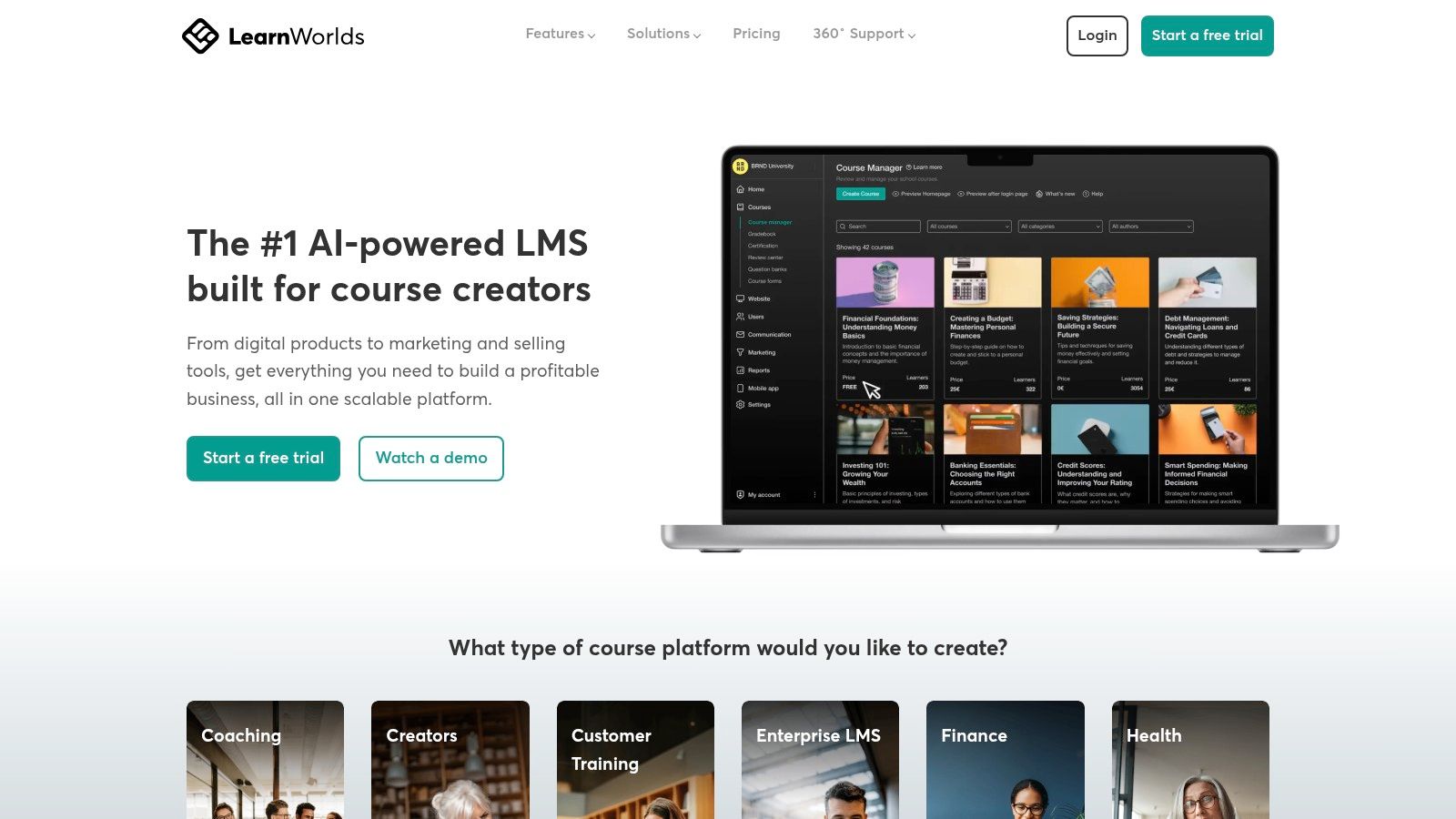
Specifically for Shopify store owners, LearnWorlds can be a powerful tool to complement your existing product line. For instance, if you sell knitting supplies, you could offer a beginner's knitting course. This not only provides additional revenue streams but also positions you as an expert in your field, building trust and encouraging repeat customers. Arts and crafts business owners can leverage LearnWorlds to share their unique skills and knowledge, creating a dedicated space for students to interact with each other and the instructor. This fosters a sense of community around your brand and establishes a more personalized connection with your audience.
LearnWorlds shines with its interactive video player, allowing you to embed quizzes, polls, and downloadable resources directly within the video. This keeps learners engaged and reinforces key concepts. Its built-in ebook creation tool simplifies the process of creating and distributing supplementary learning materials, perfect for crafting detailed guides, pattern books, or recipe collections to accompany your courses. The platform also includes a social network feature, fostering a vibrant learning community where students can connect, share their progress, and learn from each other.
Features:
- Interactive video player with notes, bookmarks, and questions
- SCORM compliance for importing external content
- White-label mobile app option
- Built-in social network for learners
- Advanced assessment tools including question banks
- E-book creation and digital downloads
Pros:
- Unique interactive content creation tools
- Strong focus on learning experience and engagement
- Built-in community features and social learning
- E-book creation and digital downloads capabilities
Cons:
- Transaction fee on the starter plan
- Steeper learning curve than simpler platforms
- More expensive than basic course platforms
- Some advanced features require higher-tier plans
Pricing: LearnWorlds offers various pricing tiers, starting with a Starter plan (currently around $29/month +$5 per course sale) and scaling up to higher-tier plans with more features and lower transaction fees. Be sure to check their website for the most up-to-date pricing.
Technical Requirements: LearnWorlds is a cloud-based platform, so there are no specific technical requirements other than a stable internet connection and a web browser.
Comparison: Compared to platforms like Thinkific or Teachable, LearnWorlds emphasizes a more interactive and immersive learning environment. While Thinkific and Teachable offer robust course creation tools, LearnWorlds prioritizes engagement features, making it a better choice if community building and interactive learning are paramount.
Implementation Tips:
- Start with a clear course outline and learning objectives.
- Leverage the interactive video features to maximize engagement.
- Utilize the social learning features to foster community and encourage peer-to-peer learning.
- Promote your courses through your Shopify store and social media channels.
- Consider offering bundled deals with your physical products and online courses.
Website: https://www.learnworlds.com/
LearnWorlds deserves a place on this list because it provides a premium learning experience, focusing on interactivity and engagement. If you are a Shopify store owner or an arts and crafts business owner looking to create high-quality, engaging online courses to build your brand and generate additional revenue, LearnWorlds is a platform worth considering. While it might have a slightly steeper learning curve and higher price point than some competitors, its focus on creating an immersive and interactive learning experience can justify the investment for those prioritizing high engagement and community building.
6. Podia
Podia offers a streamlined, all-in-one platform for creators looking to sell online courses, memberships, and digital downloads. Its straightforward approach makes it particularly attractive for Shopify store owners and arts and crafts business owners who want to expand their product offerings without getting bogged down in complex technical setups. Imagine easily adding online workshops demonstrating crafting techniques, or selling exclusive patterns and templates as digital downloads, all managed from a single dashboard alongside your physical products. Podia excels in its simplicity, allowing you to focus on creating and selling, rather than managing a complicated platform.
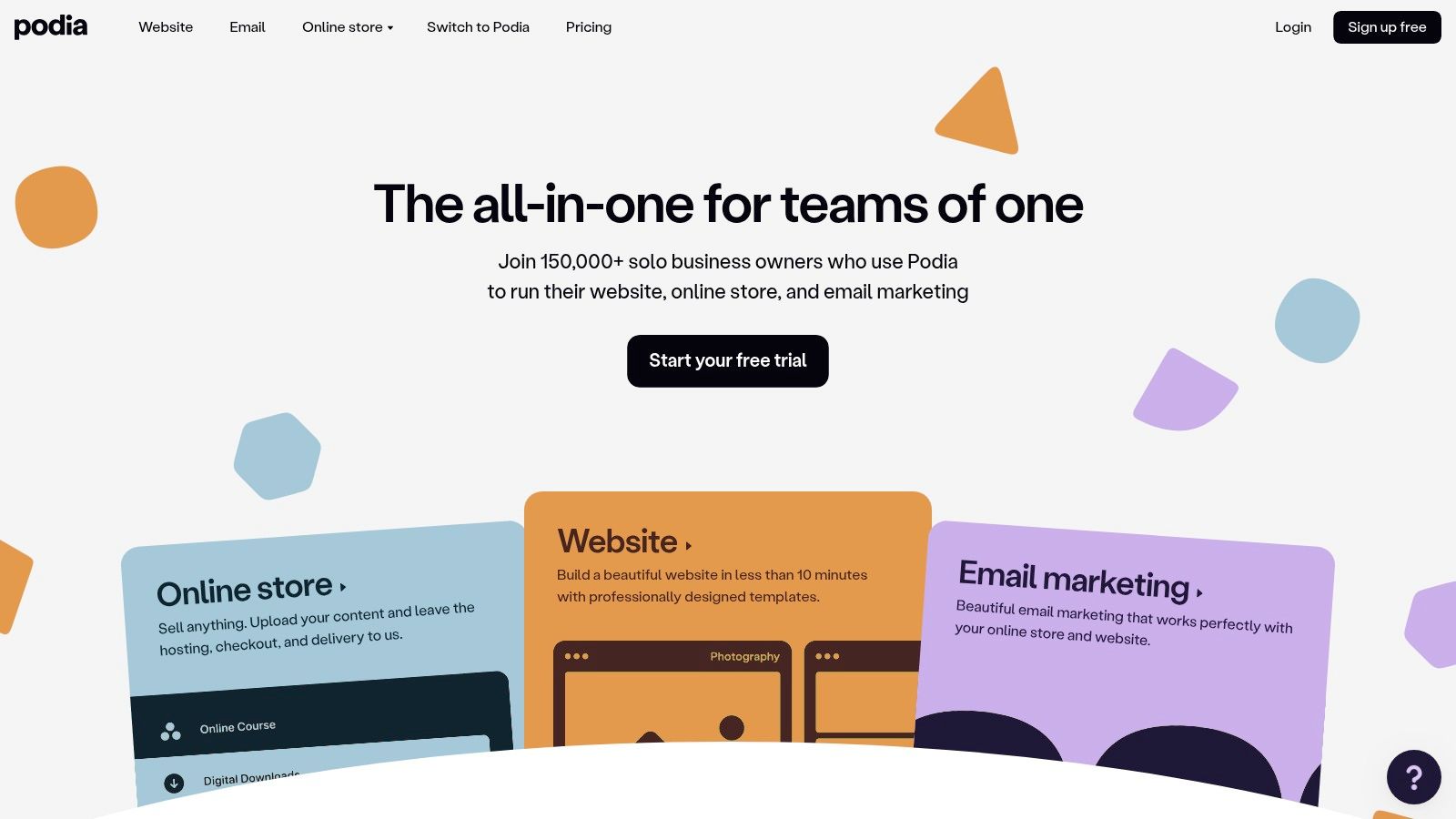
For Shopify store owners, Podia can be a powerful tool for building customer loyalty and generating recurring revenue. Offer exclusive online courses to your existing customer base, teaching them advanced techniques related to your products or providing valuable insights into your niche. Think about a Shopify store selling handmade jewelry: they could offer online courses on jewelry making, design principles, or even business tips for aspiring jewelry makers. This adds a valuable service component to your existing product line, enhancing customer engagement and creating a stronger brand community. Arts and crafts business owners can leverage Podia similarly, selling online courses showcasing their skills and expertise. Imagine a potter selling online courses on wheel throwing techniques alongside their finished pottery pieces. This allows for diversification of income streams and the opportunity to reach a wider audience.
Podia’s all-inclusive pricing model eliminates transaction fees, a significant advantage compared to platforms like Thinkific or Teachable, which often charge transaction fees or limit features on lower-tier plans. While specific pricing details may vary, Podia generally offers different tiers based on features and support. It’s worth checking their website (https://www.podia.com/) for the most up-to-date pricing information. No specific technical requirements are needed to get started with Podia beyond a computer and internet access. The platform is designed to be user-friendly, even for those with limited technical skills.
Features relevant to Shopify store owners and arts & crafts businesses:
- Unlimited courses, downloads, and members: Host as much content and as many members as you need, scaling your online offerings as your business grows.
- Integrated email marketing: Communicate directly with your students and members, promoting new courses, sharing updates, and building a strong community.
- Embeddable checkout and product widgets: Seamlessly integrate Podia’s checkout process and product displays directly into your existing Shopify store or website.
- Membership community features: Create exclusive member-only areas, fostering a sense of community and providing a platform for ongoing engagement and support.
Pros:
- No transaction fees: Keep more of your earnings.
- Simple, intuitive interface: Easy to use, even for beginners.
- All-in-one solution: Manage courses, memberships, and digital downloads from a single dashboard.
- Free migrations from other platforms: Easily switch from another platform without losing your content.
Cons:
- Fewer advanced course features: May lack some of the advanced features found in more specialized platforms.
- Limited design customization: Customization options may be more restricted compared to some alternatives.
- Basic quiz and assessment functionality: While quizzes are available, the functionality is relatively basic.
Implementation Tips:
- Plan your content strategy: Outline your course content and membership offerings before setting up your Podia account.
- Utilize the email marketing tools: Build your email list and communicate regularly with your audience.
- Integrate with your existing website: Embed checkout and product widgets for a seamless customer experience.
- Leverage the community features: Foster interaction and engagement within your membership communities.
Website: https://www.podia.com/
Podia earns its place on this list due to its simplicity, all-inclusive pricing, and focus on creator empowerment. While it may not have all the bells and whistles of more complex platforms, it provides a straightforward and affordable way for Shopify store owners and arts and crafts businesses to expand their offerings and connect with their audience in a meaningful way.
7. Teachery
Teachery stands out for its refreshing simplicity and predictable pricing, making it an attractive option for Shopify store owners and arts and crafts business owners looking to expand their revenue streams by offering online courses. It’s a platform designed for creators who prioritize ease of use and transparent costs over a vast array of complex features. If you’re comfortable handling marketing and sales primarily through your existing Shopify store and want a straightforward way to deliver course content, Teachery is worth considering. It allows you to focus on creating and delivering valuable educational content without getting bogged down by platform complexities.
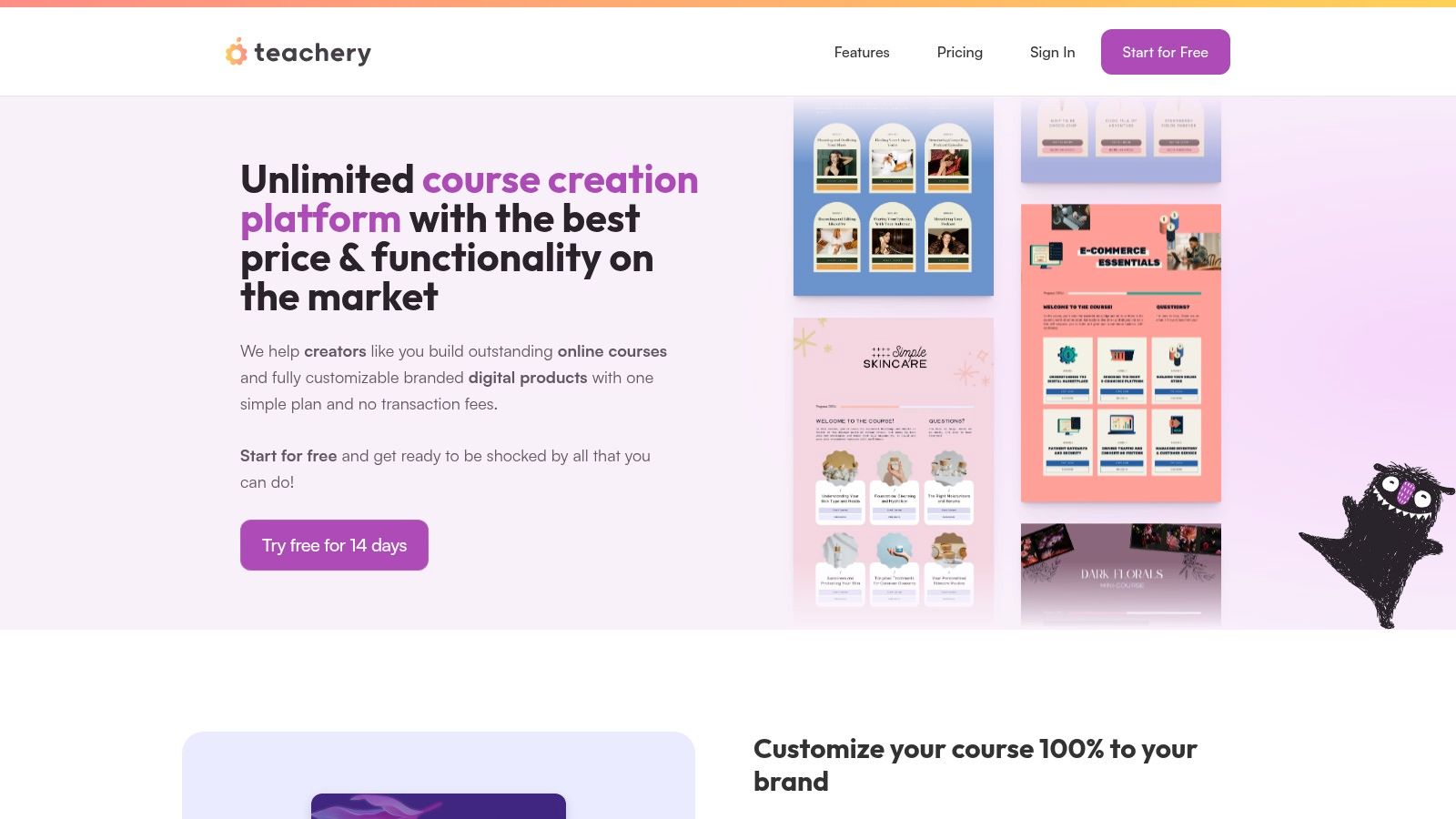
Teachery operates on a flat-rate monthly or annual subscription model (currently offering monthly plans at $49 or $470 annually), granting access to unlimited courses, students, and sales. This predictable pricing structure is particularly beneficial for creators who anticipate substantial growth in their student base, as you won’t be penalized with increasing transaction fees or forced to upgrade to a higher tier as your audience expands. This differs significantly from platforms like Thinkific or Teachable, which often charge transaction fees or limit features based on pricing tiers.
For Shopify store owners, Teachery can complement existing sales funnels. While direct integrations are limited, you can easily link your Shopify store to your Teachery courses, promoting them as additional product offerings or upsells. For example, an arts and crafts business owner selling handmade jewelry on Shopify could offer a paid online course teaching specific jewelry-making techniques, driving traffic from their product pages to their Teachery course.
Implementation Tips for Shopify Integration:
- Create compelling course landing pages within Teachery: Utilize the flexible course page editor and available templates to showcase the value of your courses and encourage sign-ups.
- Promote your Teachery courses on your Shopify product pages: Use attractive banners or call-to-action buttons to direct customers interested in learning more to your course landing pages.
- Leverage email marketing: Segment your Shopify customer list and send targeted email campaigns promoting relevant courses.
- Offer bundled deals: Package your physical products with access to your Teachery courses to incentivize purchases and provide added value.
Pros:
- Simple, transparent pricing: No transaction fees and unlimited everything makes budgeting straightforward.
- Straightforward, intuitive interface: Easy to navigate and set up, even for non-technical users.
- Unlimited courses and students: Scale your online course offerings without limitations.
Cons:
- Fewer built-in marketing features: You'll rely more on external marketing tools and your Shopify store for promotion.
- Limited integration options: Direct integrations with other platforms are minimal.
- Basic quiz and assessment functionality: If advanced assessment features are critical, you might need to consider alternative platforms.
Website: https://teachery.co/
Teachery's strength lies in its simplicity and affordability. If you're a Shopify store owner or an arts and crafts business owner looking for a no-frills platform to host and deliver online courses without breaking the bank, Teachery provides a practical and easy-to-manage solution. However, if extensive marketing features, integrations, or advanced assessment tools are essential for your course strategy, exploring other platforms with more robust functionalities may be necessary.
8. Udemy
Udemy is a massive online learning marketplace, connecting instructors with millions of students eager to learn new skills. Unlike platforms like Thinkific or Teachable where you build your own branded online school, Udemy hosts your course within its marketplace. This makes it an attractive option for creators looking to leverage a pre-existing audience without the overhead of building and marketing their own platform. For Shopify store owners and arts and crafts business owners, this can be a powerful way to reach a broader audience and generate additional revenue streams by teaching related skills. Imagine a Shopify store owner selling handmade jewelry also offering a Udemy course on jewelry making, or a crafts business owner teaching a course on a specific painting technique.
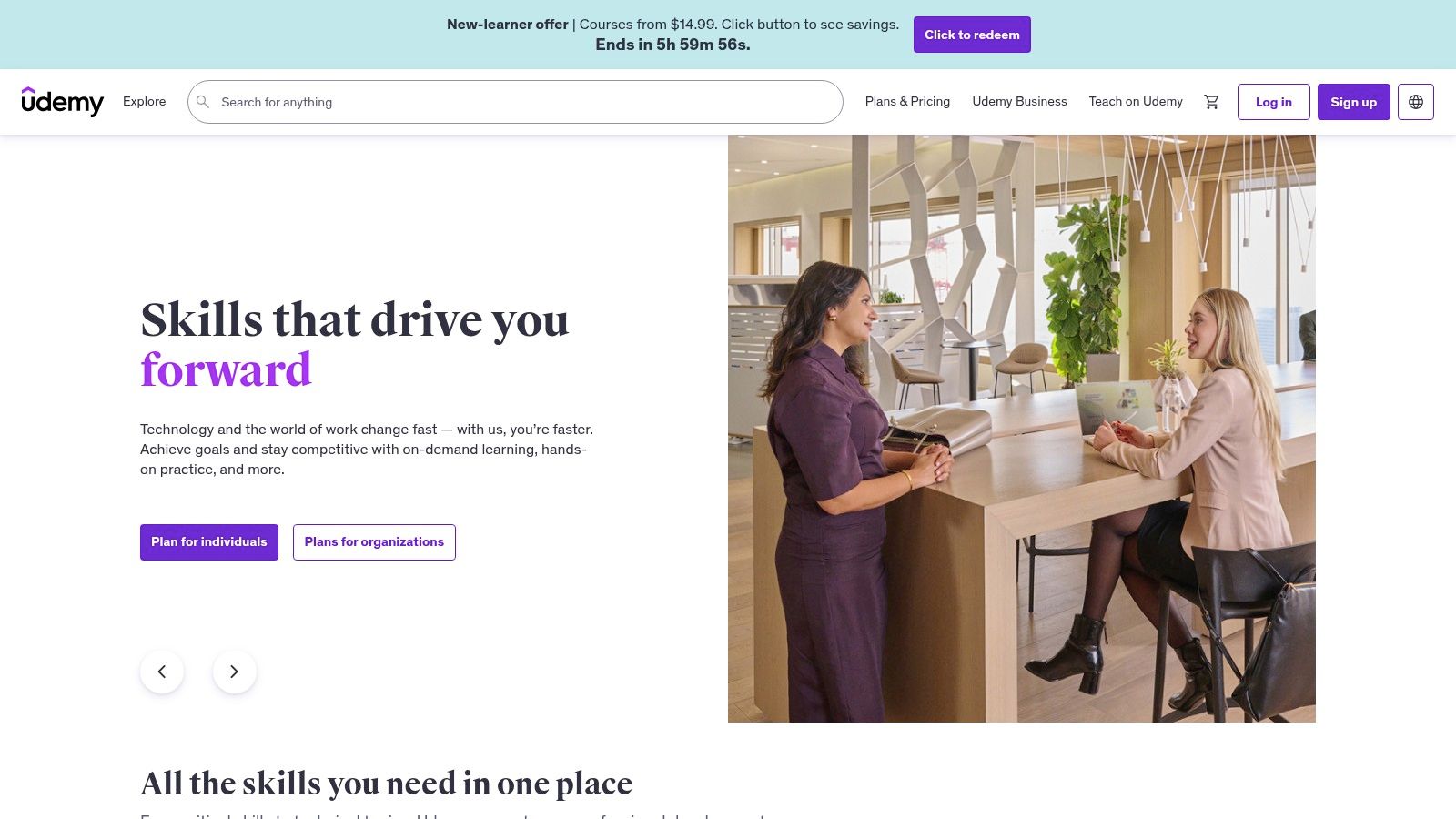
Udemy handles all the technical aspects, including video hosting, payment processing, and customer support. You focus on creating high-quality course content, while Udemy provides the infrastructure and marketing reach. They offer course creation tools that streamline the process, including features for video uploading, organizing curriculum, and interacting with students through Q&A sections and messaging.
Pricing and Technical Requirements: Creating and publishing courses on Udemy is free. However, Udemy takes a revenue share ranging from 30-50% depending on how the student found your course (e.g., through Udemy's organic search or through your own marketing efforts). There are no specific technical requirements beyond having a computer and the ability to create your course content (videos, presentations, downloadable resources, etc.).
Comparison with Similar Tools: Compared to platforms like Skillshare or Coursera, Udemy offers a wider range of topics and a larger student base. Skillshare operates on a subscription model, while Coursera primarily focuses on university-level courses. Udemy's marketplace model allows for more flexibility in pricing and course creation.
Implementation and Setup Tips for Shopify/Crafts Business Owners:
- Niche Down: Focus on creating courses specifically related to your products or services. If you sell knitting supplies on Shopify, create a course on beginner knitting techniques. If you specialize in watercolor painting, create a course on watercolor landscapes.
- Leverage Your Existing Audience: Promote your Udemy courses to your existing customer base through email marketing, social media, and your Shopify store. Offer exclusive discounts to incentivize enrollment.
- Optimize Your Course for Discoverability: Use relevant keywords in your course title and description to improve search visibility within the Udemy marketplace.
- Engage with Students: Actively participate in the Q&A section and respond to student messages to build a strong community and positive reviews.
- Cross-Promote: Include links to your Shopify store or other online platforms within your Udemy course to drive traffic and sales.
Pros:
- No upfront costs to create and publish courses.
- Built-in audience with organic discovery potential.
- Handles all technical aspects including hosting and payments.
- Platform promotions can drive significant sales.
Cons:
- High revenue share (Udemy takes 30-50% of revenue).
- Limited control over pricing and discounts.
- Restricted access to student data and email addresses.
- Highly competitive marketplace with price sensitivity.
Website: https://www.udemy.com/
Udemy’s vast marketplace offers a unique opportunity for Shopify and crafts business owners to monetize their skills and reach a wider audience. While the revenue share is a significant factor to consider, the platform’s built-in audience and streamlined infrastructure can be a powerful tool for expanding your reach and generating new income streams.
9. Moodle
Moodle (https://moodle.org/) stands apart from other online course platforms in this list because it's a completely open-source, self-hosted learning management system (LMS). While platforms like Thinkific and Teachable are geared toward selling online courses, Moodle focuses on the educational experience itself, making it a powerful tool for Shopify store owners and arts and crafts business owners who want to offer in-depth training or educational resources alongside their products.
Think of Moodle as the robust, DIY option. You have complete control over its functionality, branding, and data, but this comes at the cost of requiring technical expertise for setup and maintenance. If you're comfortable managing servers and databases, or have someone on your team who is, Moodle offers unparalleled flexibility.
For Shopify store owners: Imagine offering a comprehensive training program on how to use your products effectively, create beautiful projects, or even build a business around your niche. Moodle allows you to structure this training with lessons, quizzes, assignments, and certificates, fostering a strong community around your brand and increasing customer loyalty. For example, a shop selling artisanal soap-making supplies could offer a Moodle-based course teaching various soap-making techniques, complete with video tutorials, downloadable recipes, and a forum for students to share their creations.
For arts and crafts business owners: Moodle can be a powerful platform for teaching your craft. Imagine hosting workshops online, offering detailed project tutorials, or building a membership site with exclusive content. You control the learning environment, the branding, and the pricing (if you choose to charge). For example, a pottery artist could use Moodle to deliver online courses on wheel throwing techniques, complete with video demonstrations, progress tracking, and a community forum for students to interact and share their work.
Features and Benefits:
- Completely Customizable: Moodle is truly yours to shape. You can tailor the interface, functionality, and learning experience to perfectly match your brand and teaching style.
- Extensive Assessment Options: Go beyond simple quizzes. Moodle allows for a wide range of assessment methods, including assignments, peer reviews, and graded discussions, allowing for a comprehensive evaluation of student learning.
- Robust User Management: Easily manage student cohorts, track progress, and control access to different parts of your courses.
- Blended Learning Support: Moodle isn't just for online learning. It can be used to support blended learning environments, combining online resources with in-person instruction.
- Free to Use (sort of): The Moodle software itself is free. However, you'll need to pay for hosting, which can range from a few dollars per month to significantly more depending on your needs and the size of your student base. You may also need to invest in plugins or themes, though many free options are available.
Pros:
- Complete control over data and functionality.
- Extensive plugin ecosystem to extend functionality.
- Strong for academic and institutional use cases, indicating its robust design.
- Free core software.
Cons:
- Requires technical knowledge to set up and maintain.
- Less intuitive interface compared to commercial platforms like Thinkific or Teachable.
- No built-in marketing or sales tools. You’ll need to integrate with other platforms for this.
- Responsible for your own security and updates.
Implementation Tips:
- Start small: Don’t try to build a complex Moodle course right away. Begin with a simple course and gradually add features as you become more comfortable with the platform.
- Explore the plugin directory: Moodle’s vast plugin ecosystem can add significant functionality. Look for plugins that address specific needs, such as integrating with your Shopify store or adding marketing tools.
- Consider managed hosting: If you lack the technical expertise to manage your own Moodle installation, look for a managed hosting provider that specializes in Moodle. This will take care of the technical aspects for you, allowing you to focus on creating great content.
Website: https://moodle.org/
Moodle deserves its place on this list because it offers a powerful, flexible, and free alternative to commercial platforms. While it's not the easiest platform to use, its customization options and control over your data make it an excellent choice for businesses looking to create a comprehensive and engaging learning experience for their customers.
10. WordPress with LearnDash
WordPress with LearnDash offers a powerful and flexible solution for creating and selling online courses, particularly appealing to Shopify store owners and arts and crafts business owners who desire complete control over their brand and customer experience. By leveraging the familiar WordPress environment, this option allows you to seamlessly integrate online courses into your existing website, creating a unified hub for both products and educational content. This is particularly beneficial for those selling handmade goods or specialized supplies, as you can offer tutorials, workshops, or masterclasses directly related to your products, enhancing customer value and driving sales.
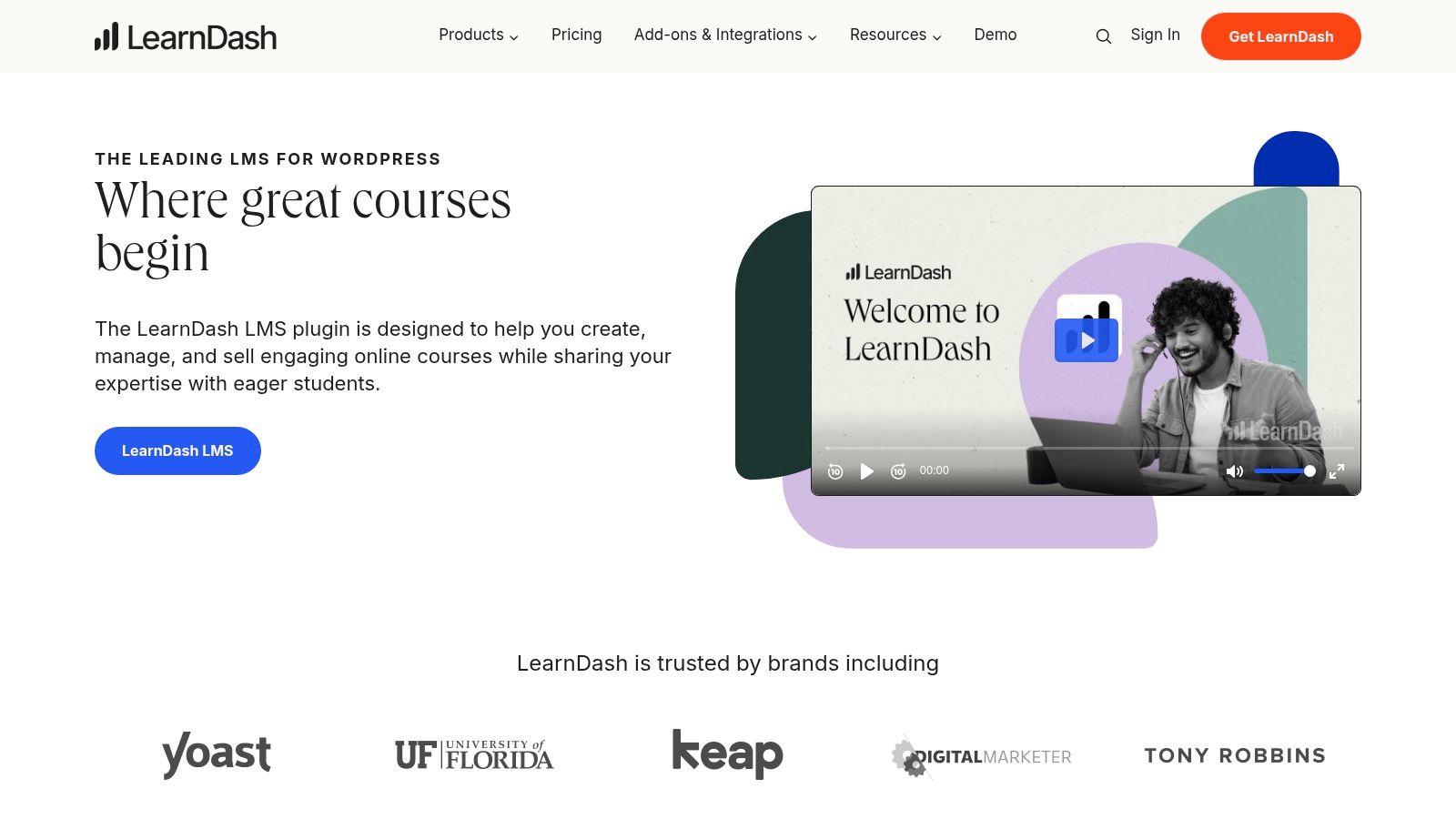
For example, a Shopify store owner selling knitting supplies could create a series of online knitting courses, from beginner to advanced levels. An arts and crafts business owner specializing in pottery could offer online workshops demonstrating specific techniques or projects. This approach not only provides additional revenue streams but also fosters a community around your brand and positions you as an expert in your field.
LearnDash, a premium WordPress plugin, transforms your website into a fully functional learning management system (LMS). This means you have access to features like drip-fed content scheduling, allowing you to release lessons over time, keeping students engaged and preventing overwhelm. The advanced quizzing system helps assess student progress, while certificates and badges upon completion provide a sense of accomplishment and encourage further learning. The ability to manage groups and create user forums fosters a sense of community among your students. Critically, LearnDash integrates seamlessly with various membership plugins and payment gateways, streamlining the sales process and allowing you to manage subscriptions effectively. This integrates perfectly with the business model of many Shopify store owners.
Pricing: LearnDash offers various pricing tiers starting from $159 per year for a single site license. While this represents a higher upfront cost compared to some hosted platforms, it eliminates recurring monthly fees and transaction fees (beyond standard payment processing fees). This one-time payment model can be particularly advantageous for businesses with a growing student base.
Technical Requirements: While LearnDash simplifies the process of creating an online course, it requires some technical proficiency. You'll need to manage your WordPress hosting, security, and updates. Furthermore, while LearnDash offers core LMS functionality, you might need to install additional WordPress plugins for specific features like advanced email marketing or specific integrations with your Shopify store. Setting up LearnDash requires more initial effort than hosted solutions, but offers unparalleled control and customization in the long run.
Implementation Tips:
- Plan Your Course Structure: Before diving into LearnDash, carefully outline your course content, learning objectives, and target audience.
- Choose a Suitable WordPress Theme: Select a theme that is compatible with LearnDash and aligns with your brand aesthetic.
- Explore Essential Plugins: Research and install plugins that enhance functionality, such as membership management, email marketing integration, and advanced quizzes.
- Test Thoroughly: Before launching your course, thoroughly test all features to ensure a smooth and engaging learning experience.
- Utilize LearnDash's Documentation and Support: Leverage the extensive documentation and support resources available to overcome any technical challenges.
Compared to all-in-one platforms like Thinkific or Teachable, LearnDash offers greater control and flexibility, albeit with a steeper learning curve. This makes it ideal for Shopify store owners and arts and crafts business owners who prioritize ownership, customization, and seamless integration with their existing websites. The link to LearnDash is: https://www.learndash.com/
Top 10 Online Course Platforms: Side-by-Side Comparison
| Platform | Core Features ✨ | Experience ★ | Value Proposition 💰 | Target Audience 👥 |
|---|---|---|---|---|
| 🏆 Tevello | Shopify integration, courses & communities, customizable learning paths, automation | Intuitive & well-supported | Streamlined eCommerce; boosts upselling & cross-selling | Shopify store owners |
| Teachable | Course hosting, branding, integrated marketing tools | User-friendly | All-in-one platform; fees may apply | Course creators |
| Thinkific | Drag-and-drop builder, multimedia support, no transaction fees | Robust & feature-rich | Advanced features with tiered pricing | Content creators |
| Kajabi | All-in-one: course creation, website, funnels, email marketing | Professional, yet steeper learning curve | Comprehensive solution; premium pricing | Entrepreneurs |
| LearnWorlds | Interactive video, social learning, e-book creation | Highly engaging | Premium features with higher costs | Educators & trainers |
| Podia | Courses, memberships, digital downloads, built-in email tools | Simple and intuitive | Flat-rate pricing; no transaction fees | Creators seeking simplicity |
| Teachery | Unlimited courses & students, flat-rate pricing, drip content scheduling | Straightforward | Budget-friendly; transparent pricing | Budget-conscious creators |
| Udemy | Marketplace access, built-in course tools, promotional opportunities | Easy setup with vast exposure | No upfront cost; revenue split applies | Instructors seeking large audiences |
| Moodle | Open-source LMS, extensive customizability, modular design | Flexible but technical | Free software (hosting & maintenance extra) | Institutions & tech-savvy educators |
| WordPress w/ LearnDash | LMS plugin with drip-feed, quizzes, badges & group management | Highly flexible though more complex | One-time payment; complete ownership | WordPress users & developers |
Ready to Empower Your Online Learning Empire?
Choosing the right online course platform is paramount to your success. From the robust all-in-one features of Kajabi to the flexible open-source nature of Moodle and WordPress with LearnDash, and the specialized ecommerce integrations of Tevello, each platform offers a unique set of advantages. We've explored ten popular options, each catering to various needs and budgets. Key takeaways include understanding pricing structures (transaction fees vs. flat rates), the importance of marketing features, the level of customization available, and the specific needs of your target audience. Whether you're aiming for a simple, streamlined setup like Teachery or a fully customizable experience like LearnWorlds, remember to prioritize the features that align with your business goals.
For Shopify store owners, integrating your online courses seamlessly with your existing sales funnel is crucial. Platforms like Tevello offer specialized integrations that streamline this process, enabling you to connect with your existing customer base and leverage your Shopify store for course sales. Independent artists and crafts business owners might find platforms like Thinkific or Podia more suitable, given their affordability and ease of use for creating and selling creative courses. Before launching, thoroughly test your chosen platform's functionality and user experience. For ensuring the quality and performance of your online course platform, consider exploring various software testing tools. This will help you identify and address any potential issues before they impact your learners.
Ultimately, the ideal platform empowers you to connect with your audience, share your expertise, and grow your business. Take the time to evaluate your specific needs and experiment with different platforms before making a final decision.
Ready to seamlessly integrate your online courses with your Shopify store? Explore the power of Tevello, a platform designed to help Shopify merchants create and sell engaging courses directly to their customers, boosting both engagement and revenue.




